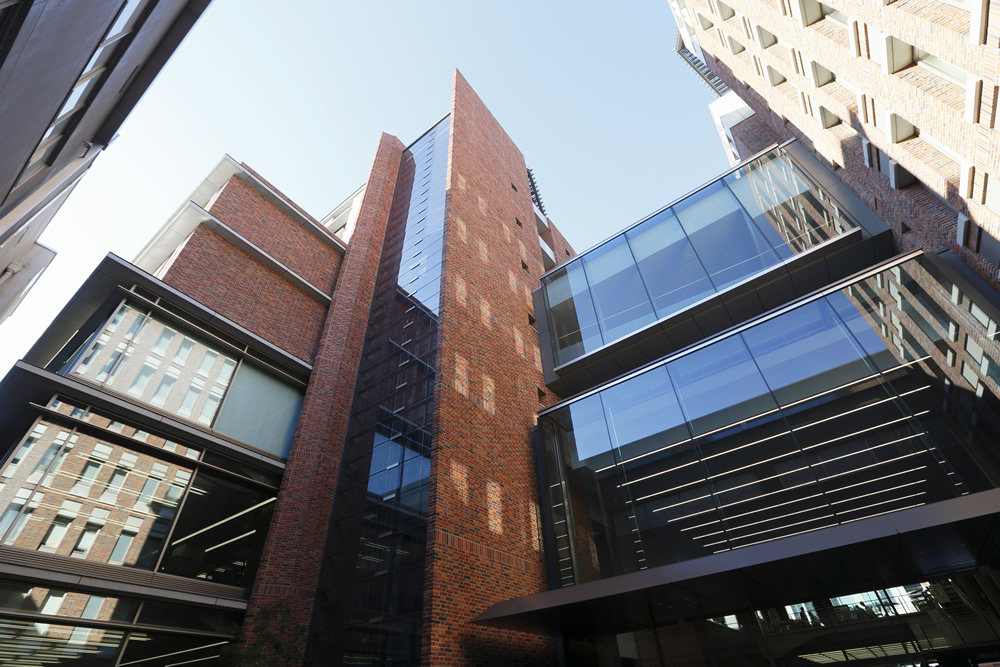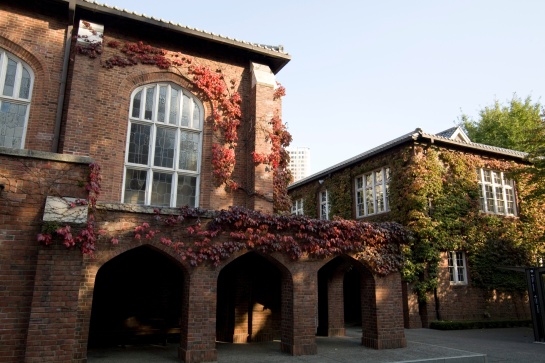Library Education at Rikkyo University
Certification Program
Goals of the Program
Training of Information Specialists
Promoting an International Perspective
Course of Study

Rikkyo University Ikeburo Library
The two tracks within the Librarian Course, Librarian and School Librarian, are described below. While the government has established the minimum number of credits required for each course of study (24 credits and 10 credits, respectively), Rikkyo is among a small group of universities requiring additional study (32 credits for the Librarian track and 16 for the School Librarian track.) The curriculum is distinguished by the availability of these opportunities for additional training. In addition, university graduates (of Rikkyo or other universities) may, on successful completion of an examination, enroll in classes on a for-credit basis.
Librarian Certification
Labor market trends in Japan have made it difficult in recent years for Librarian Course graduates to find professional work in libraries and library-related businesses. However, graduates are putting their education to use in a variety of other areas, such as information technology, publishing, and book-selling. Students are able to leverage the knowledge and skills acquired in the Librarian Course in their job-hunting activities and future careers. In addition, through participation in library practicums, students receive valuable experience in the workplace.
School Librarian Certification
According to the School Library Law, all schools with 12 or more classes must employ a certified School Librarian. Many school districts give special consideration to applicants who have both teaching and school librarian certification, and may give them additional points on the employment examination. School Librarian classes at Rikkyo are generally small, allowing students to receive individual attention. The program aims to train professionals who can work at the highest level in the school library while also serving as instructors.
Library Practicum
History of Library Education at Rikkyo

Chapel and Main Building
After the war and the promulgation of Japan’s Library Law, Rikkyo established the Library Course in 1967 under the directorship of Professor Ebisawa Arimichi, the noted historian. Library educators Shimizu Shozo and Miyabe Yoriko also joined the faculty and each went on to serve as director, in turn. Present director, Nakamura Yuriko (Ph.D. University of Tokyo), came to Rikkyo in 2011.
Under the leadership of Professor Miyabe, a second senior position, Specially Appointed Professor, was added. Chiyo Masaaki (National Diet Library Librarian, retired), Nagata Haruki (professor emeritus, Tsukuba University), and Ueda Shuichi (professor emeritus, Keio University) served successively in the position, which is now held by Ellen H. Hammond (Yale University East Asia Library director, retired).
Over the years, the Librarian Course at Rikkyo has graduated a large number of outstanding library professionals. Graduates of the program have gone on to careers in a wide range of institutions: the National Diet Library, prefectural-level libraries such as the Tokyo Metropolitan Library and Saitama Prefectural Library, and prominent public libraries such as the Yokohama City Central Library and the Urayasu City Central Library, as well as various academic and school libraries. In addition, some students from the program go on to graduate school for further training. Graduates of Rikkyo’s Librarian Course are represented in the ranks of Japan’s notable library leaders.
Research and Educational Accomplishments
Librarian Course Bulletin
Public Lectures and Symposiums
November 2017
Presentations by Hara Osamu (Rikkyo University Library), Nakamura Yuriko (Professor, Rikkyo University), and Koga Takashi (Professor, Tenri University)
October 2017
Lecture by Dr. Sandra Hirsh, Director, School of Information, San Jose State University, U.S.A.
January 2017
Lecture by Dr. Joan Portell Rifà, Adjunct Instructor, Autonomous University of Barcelona
[Sponsored by Shirayuri Women’s University with support from Rikkyo University]
May 2016
Lecture by Dr. Carol Duncan, Professor Emerita, Ramapo College, U.S.A.
December 2015
Lecture by Professor Shibanai Yasufumi, Tokyo Keizai University
July – October 2014
Library Exhibit to celebrate the Rikkyo alumna Uehashi Nahoko’s receipt of the Hans Christian Andersen Award for Writing in 2014.
Grants and Collaborative Projects
Rikkyo University Special Fund for Research (SFR) Project. “Current status and opportunities for coordination of training for museums, libraries, and archives (MLA) professional staff.” (2017- )
Rikkyo University Invited Visiting Scholar Program. Funding to invite Dr. Sandra Hirsh, Director, School of Information, San Jose State University, as a visiting scholar. (2017)
Japan Science and Technology Agency Research Institute of Science and Technology for Society (RISTEX) Project. “Analysis of “Philosophical Dialogue” (tetsugaku taiwa) in a public library setting: results from libraries in Iwate and Miyagi prefectures.” Funding for students and faculty to investigate application of “philosophical dialogue” methods based on the theories of Rikkyo University professor Kono Tetsuya. (2016-2017)
“Analysis of curricular practices in awarding school librarian-instructor certification.” Funding for a series of five symposia in collaboration with Osaka Kyoiku University. (2016)